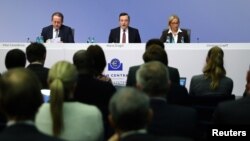President Mario Draghi has some explaining to do — about why the European Central Bank is leaving its stimulus programs running nearly full blast while inflation and growth are picking up.
Draghi is expected to use his news conference Thursday to underline the bank's determination to stick with its December decision to keep pumping newly printed money into the economy at least through the end of the year.
The purchases are aimed at boosting inflation from dangerously low levels and supporting an economy that's slowly gathering steam.
The central bank left its key interest rates and stimulus programs unchanged at a meeting Thursday of its 25-member governing council, as analysts expected.
The ECB head is likely to stress that there's no convincing sign yet of an upturn in inflation, and that the recent uptick is caused by higher oil prices and not by a fundamental improvement in demand for goods in the economy.
Europe's economy also faces possible political shocks this year from elections in France, the Netherlands, and possibly Italy. Right-wing, anti-European Union politicians such as French presidential candidate Marine Le Pen will get a chance to test their support with voters.
Meanwhile, British Prime Minister Theresa May has said she will start talks with the EU on the terms of leaving the 28-country bloc, after voters backed the "leave" side in a referendum in June. Britain, an EU member that does not use the euro, is a major trading partner for the eurozone and its departure from the bloc and its free-trade zone raises the possibility of disruption for business.
Part of his task will be to undercut arguments by stimulus skeptics, many of them in Germany, who think it's time to start thinking about turning off the flow of cheap money to the economy. Stimulus critics have pointed to low returns for savers — who get no return on conservative investments with interest rates near zero — and say cheap borrowing just props up governments that don't want to crack down on spending.
Annual inflation in the 19 country eurozone jumped to 1.1 percent in December from 0.6 percent the month before. But core inflation, which excludes volatile fuel and food, has been stuck at 0.8 percent-0.9 percent, and higher prices aren't being reflected in wage growth.
The ECB is sticking with stimulus, in contrast to the U.S. Federal Reserve. The Fed has raised interest rates twice and Fed Chair Janet Yellen said Wednesday that the U.S. central bank might hike rates ``a few times a year'' until 2019.
The U.S. recovery following the Great Recession is farther advanced, with unemployment of 4.7 percent compared to 9.8 percent in the eurozone. The currency union saw moderate economic growth of 0.3 percent in the third quarter over the quarter before. The Frankfurt-based ECB is the eurozone's monetary authority, setting interest benchmarks for member states.
The ECB's stimulus includes a benchmark interest rate of zero on money it loans to banks. It also has imposed an extraordinary negative interest rate of minus 0.4 percent on deposits it takes from commercial banks, a step aimed a pushing them to lend, not hoard, their cash.
The central bank has also been buying 80 billion euros ($86 billion) a month in government and corporate bonds from banks using newly printed money, a step which floods the financial system with fresh cash. From April, the ECB will buy a reduced amount of 60 billion euros a month until the end of the year. Even after that, it's expected that the monetary infusions will be only gradually reduced.
The aim is for all that cheap credit and new money to find its way to businesses in the form of cheaper loans to support investments and hiring.
Such monetary expansion should, in theory, raise inflation closer to the ECB's goal of just under 2 percent considered best for the economy. But progress has been slow.




